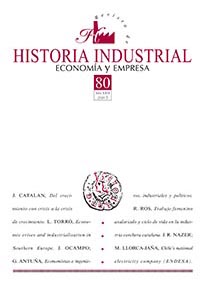From growth with crises to crisis of growth. The great late-medieval depression and the Catalan economy, 1315-1516
DOI:
https://doi.org/10.1344/rhi.v29i80.30490Keywords:
crisis, Mediterranean capitalism, great late-medieval depression, Catalonia, BarcelonaAbstract
After three centuries of commercial revolution and progress in manufacturing during the Medieval Climate Anomaly, the Mediterranean experienced a period of famine, increasing military conflicts and the black death pandemic during the 14th century, at the time of the Wolf Solar Minimum. The combined effect was to decrease population, agrarian and industrial output, trade, land rent and fiscal income and to raise agrarian yields, wages, seigniorial debts and distributional conflicts. In spite of recurring shocks, Barcelona and its hinterland, the Principality of Catalonia, recorded a net trend of growth up to the early 15th century, which took place together with new forms of government intervention such as fiscal reforms, devaluations, protectionism and public banking. On the contrary, during most of the 15th century, Barcelona and Catalonia experienced an unequivocal great depression, which coincided with the Spörer Solar Minimum. Too high costs of imperialism in Napoli contributed to exacerbate social and institutional domestic divides. The reaction of the Catalan nobility and the intransigence of the Barcelona oligarchy regarding reformist proposals ended in total war, with enduring consequences for long term development. Barcelona, which had successfully emulated the path of development of Venice, Genoa and Florence, lagged far behind throughout 1462-1516. Although the quality of life of Catalan peasants might have improved and some merchants began to make profits in the Atlantic with the slave and sugar businesses, it did not compensate the costs of commercial decline in the Mediterranean and the loss of markets for Catalan manufactures.
Downloads
Downloads
Published
How to Cite
Issue
Section
License
The author assigns all rights to the publisher. Creative Commons
The author who publishes in this journal agrees to the following terms:
- The author assigns all intellectual property rights exclusively to the publisher for the entire duration of the applicable intellectual property rights.
- The publisher will distribute the texts under the Creative Commons Attribution License, which allows others to share the work, provided that they acknowledge the authorship, its initial publication in this journal, and the conditions of the license.





